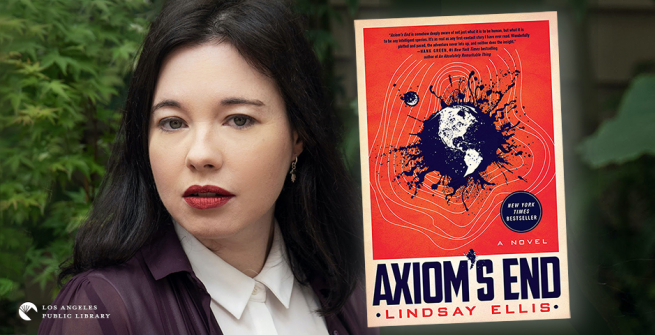Lindsay Ellis is an author, Hugo finalist, and video essayist who creates online content about media, narrative, and film theory. After earning her bachelor's in Cinema Studies from NYU's Tisch School of the Arts, she earned her MFA in Film and Television Production from USC's School of Cinematic Arts with a focus in documentary and screenwriting. She lives in Long Beach, California. Axiom's End is her debut novel and she recently agreed to talk about it with Daryl Maxwell for the LAPL Blog.
What was your inspiration for Axiom’s End?
A combination of the pitch, “What if Wikileaks broke that First Contact had happened?” and the fact that The Shape of Water won a bunch of Oscars.
Are Cora, Ampersand, or any of the other characters in the novel inspired by or based on specific individuals?
Nils as a concept was based on Julian Assange, but I didn’t want his personality based on the man, so any similarities to Assange’s actual life is a coincidence. The Sabino-Ortegas are very loosely based on the families of a couple of my college roommates. Sev Ghasabian, Vincent Park, and Kaveh Mazandarani (who is mentioned in Axiom but is a main character in the sequel) are all named after people I went to USC with.
How did the novel evolve and change as you wrote and revised it? Are there any characters or scenes that were lost in the process that you wish had made it to the published version?
Demi (whose name was originally Ceres) was a bigger presence in earlier versions, but despite the fact that the ending was always planned, Cora and Ampersand’s relationship was less, shall we say, intense in earlier versions.
Do you believe that there is life in the universe (intelligent or otherwise) or do you believe that we’re alone in the galaxy?
I think that by sheer virtue of statistics it’s highly unlikely there is no life anywhere in the universe, but my suspicion is, as Ampersand claims, that intelligence is the filter—life could be common, but intelligent life is rare. But I’m just as ignorant as anyone; it’s impossible to make any meaningful extrapolations from a sample size of one.
Why did you choose to set the novel in the recent past (2007) instead of making it contemporary or in the near future?
Far too many of the things that happen in the novel just don’t make sense in the current political landscape.
What’s currently on your nightstand?
The Invisible Life of Addie LaRue by VE Schwab and Blacktop Wasteland by SA Crosby
What was your favorite book when you were a child?
Was there a book you felt you needed to hide from your parents?
Nope.
What is a book you've faked reading?
I still haven’t finished Moby Dick.
Can you name a book you've bought for the cover?
The Year of the Flood by Margaret Atwood.
Is there a book that changed your life?
Speaker for the Dead by Orson Scott Card (and given how he has used his influence in recent years, I’m not proud of that, but it is what it is), and the entire Transformers: More Than Meets The Eye/Lost Light series by James Roberts. No, really.
Can you name a book for which you are an evangelist (and you think everyone should read)?
Parable of the Sower by Octavia Butler.
What is your idea of THE perfect day (where you could go anywhere/meet with anyone)?
At this point it would just be getting out of this country
What is the question that you’re always hoping you’ll be asked, but never have been? What is your answer?
I suppose I’m more interested in seeing discourse and discussion and speculation about the book than I am in being asked questions or reading reviews.
What are you working on now?
Truth of the Divine, which is the sequel to Axiom’s End.

